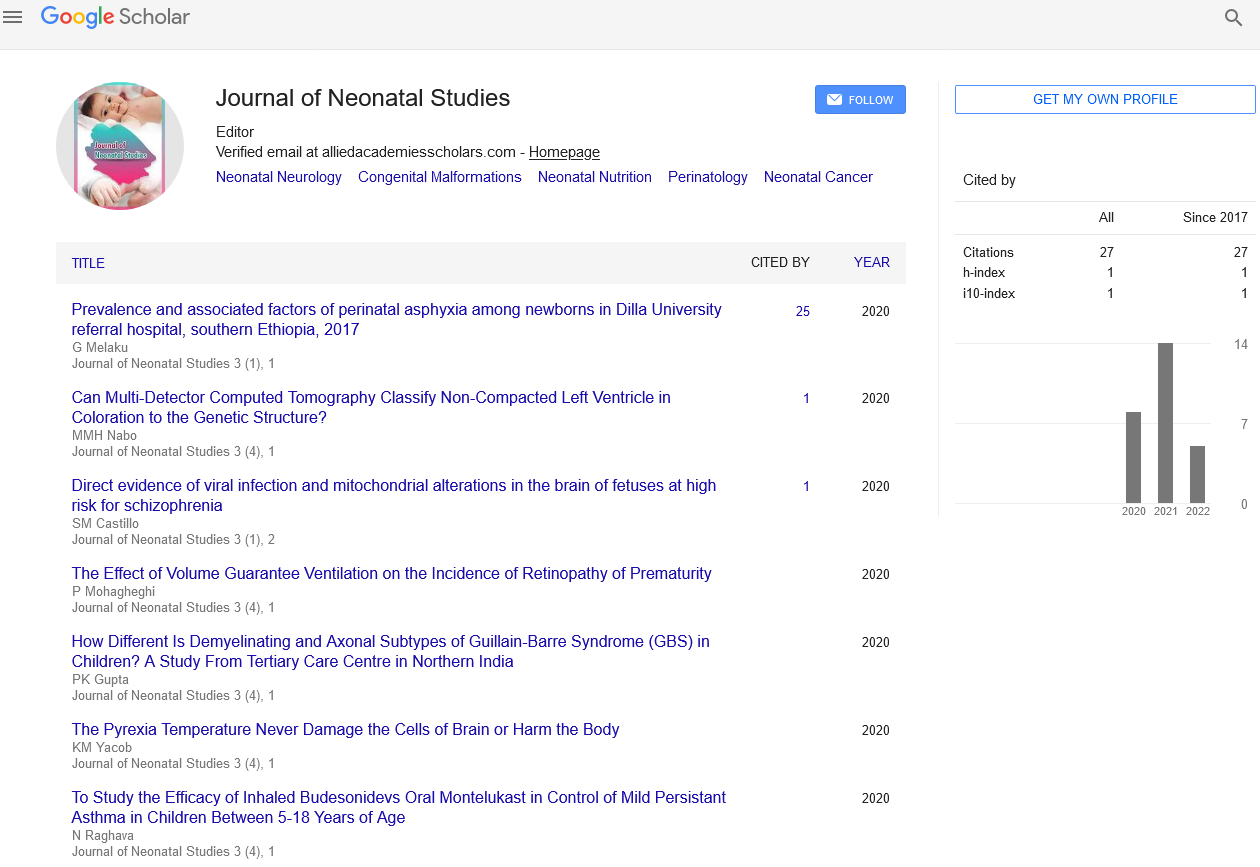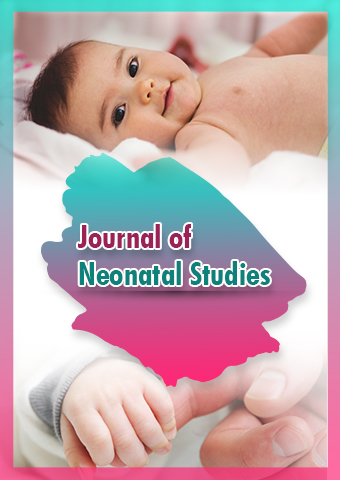Review Article - Journal of Neonatal Studies (2023) Volume 6, Issue 4
A Short Note on Neonatology and the Birth of Neonatology
Andrew Symonds*
Department of Stem Cell and Research, Cameroon
Department of Stem Cell and Research, Cameroon
E-mail: 123andrew@edu.in
Received: 01-Aug-2023, Manuscript No. jns-23-109479; Editor assigned: 2-Aug-2023, PreQC No. jns-23- 109479(PQ); Reviewed: 15-Aug-2023, QC No. jns-23-109479; Revised: 22-Aug-2023, Manuscript No. jns-23- 109479(R); Published: 29-Aug-2023; DOI: 10.37532/jns.2023.6(4).88-91
Abstract
Neonatology is a specialized branch of pediatrics that focuses on the medical care and management of newborn infants, particularly those born prematurely or with critical medical conditions. Neonatologists play a crucial role in providing comprehensive and specialized care for neonates during the critical early stages of life. This abstract explores the key aspects of neonatology, including its historical development, the scope of practice, common medical conditions encountered, advancements in technology and treatment modalities, and the challenges faced in improving neonatal outcomes. The importance of neonatal intensive care units (NICUs) and multidisciplinary teamwork in delivering optimal care is also emphasized. As neonatology continues to evolve, research and advancements in this field are critical for enhancing the survival rates and overall well-being of neonates worldwide. Neonatology is a specialized field of pediatrics that focuses on the medical care of newborn infants, especially those born prematurely or with critical medical conditions. This branch of medicine has evolved significantly over the years, driven by advancements in medical technology, improved understanding of neonatal physiology, and better management strategies. Neonatologists play a crucial role in providing comprehensive and specialized care to neonates, with the ultimate goal of ensuring optimal outcomes and improving the survival rates of these vulnerable infants. This abstract provides an overview of neonatology, highlighting its significance in modern healthcare and its continuous efforts to enhance the quality of life for the most delicate members of society.
Keywords
Neonatology • Premature infants • Newborn care • Neonatal intensive care unit • NICU • Pediatrics • Neonatal medical conditions • Neonatal technology • Neonatal outcomes • Neonatal research • Neonatal advancements
Introduction
The birth of a baby marks a momentous occasion, filling the hearts of families with joy and hope for the future. However, for some newborn infants, the journey towards a healthy life is fraught with challenges. Neonatology, a medical discipline dedicated to the care of neonates, has emerged as a beacon of hope for these vulnerable beings, offering them a chance to overcome critical health issues and thrive. Neonatology is a specialized branch of pediatrics that focuses on the medical management of newborns, particularly those born prematurely or with severe medical conditions. The field has witnessed remarkable growth over the past decades, fueled by groundbreaking research, technological advancements, and a deeper understanding of neonatal physiology [1].
Premature birth, a common occurrence in modern society, brings with it an array of complex medical problems that require immediate attention and specialized care. In such cases, neonatologists, equipped with a deep knowledge of newborn physiology and cutting-edge medical interventions, play a pivotal role in ensuring the survival and well-being of these fragile infants [2].
Beyond premature births, neonatology encompasses a broad spectrum of medical challenges, including respiratory distress, congenital anomalies, infections, metabolic disorders, and neurological complications. These conditions demand expert diagnosis, individualized treatment plans, and continuous monitoring to provide the best possible outcomes for newborns and their families. This paper explores the fascinating world of neonatology, delving into the evolution of this field, the key milestones in its development, and the critical role it plays in modern healthcare. As we journey through the various aspects of neonatology, we will gain insights into the challenges faced by neonatologists, the technological innovations that have revolutionized care, and the multidisciplinary approach required to optimize neonatal outcomes [3].
Discussion
Neonatology: nurturing new lives in the first few weeks
Neonatology, a branch of medicine that specializes in the care of newborn infants, is a critical field that plays a vital role in safeguarding the lives of the most vulnerable members of society. Neonatologists are highly trained healthcare professionals who dedicate themselves to providing expert care to premature or sick newborns in Neonatal Intensive Care Units (NICUs) and special care nurseries. The field of neonatology has evolved significantly over the years, with advances in medical technology and research, leading to improved outcomes for premature babies and infants with complex medical conditions [4].
Birth of neonatology: a historical perspective The term “neonatology” was first coined in the 1960s, but the history of caring for premature and sick infants dates back to antiquity. In ancient times, the survival rate of premature infants was incredibly low, and their care was largely left to fate or superstition. However, in the early 20th century, advances in medical science, particularly in the fields of pediatrics and obstetrics, led to significant improvements in neonatal care [5].
The first neonatal incubator was developed by Dr. Pierre Budin in the late 1800s, and this marked a turning point in the care of premature infants. Subsequent decades saw further advancements, including the introduction of respiratory support and the discovery of surfactant, a substance crucial for lung function in premature babies.
Role of a neonatologist: caring for the tiniest patients
Neonatologists are specially trained pediatricians who undergo additional years of training to focus on the unique medical needs of newborns. Their expertise encompasses a wide range of conditions, including prematurity, Respiratory Distress Syndrome (RDS), sepsis, congenital anomalies, and more. They work closely with a multidisciplinary team, including neonatal nurses, respiratory therapists, nutritionists, social workers, and other healthcare professionals, to provide comprehensive care to newborns and their families.
The primary goal of a neonatologist is to ensure the best possible outcomes for their patients. They monitor vital signs, manage ventilator support, administer medications, and oversee nutrition to promote growth and development. Neonatologists also support parents and caregivers during this emotionally challenging time, providing information, comfort, and guidance throughout the baby’s stay in the NICU [6].
Prematurity and the NICU: challenges and innovations
Premature birth, defined as birth before 37 weeks of gestation, is one of the most significant challenges in neonatology. Premature babies often face complications related to underdeveloped organs, particularly the lungs, and may require intensive respiratory support and specialized care.
In recent years, medical advancements have significantly improved the survival rates of premature infants. Surfactant therapy, which helps improve lung function, has become a standard treatment for premature babies with respiratory distress syndrome. Additionally, Continuous Positive Airway Pressure (CPAP) and High-Frequency Oscillatory Ventilation (HFOV) have proven effective in supporting the fragile respiratory systems of premature newborns [7].
Importance of family-centered care
Family-centered care is an essential aspect of neonatology. Recognizing the profound impact of a newborn’s hospitalization on parents and families, neonatal units have shifted their approach to include families as integral members of the care team. Neonatologists and neonatal nurses now strive to involve parents in decisionmaking, encourage kangaroo care (skin-toskin contact), and promote bonding through activities like reading and singing to the baby.
Research and technological advancements
Neonatology is a rapidly evolving field, with ongoing research and technological advancements continually pushing the boundaries of what is possible. Medical researchers explore ways to improve preterm birth prevention, enhance outcomes for premature babies, and develop new therapies for various neonatal conditions [8].
Technological innovations play a vital role in improving neonatal care. Advanced monitoring systems, such as continuous vital sign monitoring and brainwave activity tracking, provide realtime data to help healthcare providers detect early signs of distress and intervene promptly. Additionally, developments in telemedicine enable neonatologists to consult with specialists from other institutions, enhancing the quality of care provided [9].
Ethical considerations in neonatology
The practice of neonatology is not without ethical challenges. In situations where a newborn faces significant health issues and poor prognosis, neonatologists and parents may have to make difficult decisions regarding the best course of action. Ethical principles, such as beneficence (doing what is best for the baby), non-maleficence (avoiding harm), and respect for the baby’s autonomy (if possible) guide these difficult discussions [10].
Conclusion
Neonatology is a field of medicine that embodies hope and dedication. Neonatologists and their teams work tirelessly to provide the best possible care to newborns, overcoming challenges and leveraging technological advancements. Through their efforts, they give a fighting chance to the tiniest and most vulnerable members of our society, helping them grow into healthy and happy individuals. As medical research progresses and technology advances, the field of neonatology will undoubtedly continue to thrive, saving countless lives and shaping the future of healthcare for generations to come. Neonatology plays a vital role in safeguarding the health and well-being of newborn infants, making it an indispensable field within pediatrics and medicine as a whole. The specialized care provided by neonatologists during the critical early stages of life has significantly contributed to improving neonatal outcomes and reducing infant mortality rates globally.
Over the years, advancements in medical technology, research, and Neonatal Intensive Care Unit (NICU) practices have further enhanced the ability to diagnose and treat various neonatal conditions, providing a fighting chance for even the most premature or critically ill infants. Neonatologists expertise in managing preterm births, respiratory distress syndrome, congenital anomalies, infections, and other complex medical conditions has shown remarkable progress in increasing survival rates and minimizing long-term health complications.
Despite the significant achievements, neonatology continues to face challenges, such as the ethical dilemmas surrounding end-oflife decisions, limited access to neonatal care in certain regions, and potential long-term consequences of early interventions. Thus, ongoing research, collaboration, and global healthcare initiatives are necessary to address these challenges and further enhance the quality of neonatal care.
In the years to come, we can expect neonatology to remain at the forefront of medical advancements, continuously improving neonatal outcomes and shaping the future of pediatric medicine. The dedication and compassion demonstrated by neonatologists and healthcare professionals in this field will undoubtedly continue to make a profound impact on the lives of countless newborns and their families, promoting a healthier and brighter start to life for the youngest members of our society.
Acknowledgement
None
Conflict of Interest
None
References
- Imrie, Rob. Industrial change and local economic fragmentation: The case of Stoke-on-Trent. Geoforum. 22, 433-453 (1991).
- Jackson, Peter. The multiple ontologies of freshness in the UK and Portuguese agri food sectors. Trans Inst Br Geogr. 44, 79-93 (2019).
- Tetila EC, Machado BB et al. Detection and classification of soybean pests using deep learning with UAV images. Comput Electron Agric. 179, 105836 (2020).
- Kamilaris A, Prenafeata-Boldú F. Deep learning in agriculture: A survey. Comput Electron Agric.147: 70-90 (2018).
- Mamdouh N, Khattab A. YOLO-based deep learning framework for olive fruit fly detection and counting. IEEE Access. 9, 84252-8426 (2021).
- Brunelli D, Polonelli T, Benini L. Ultra-low energy pest detection for smart agriculture. IEEE Sens J. 1-4 (2020).
- Suto J. Condling moth monitoring with camera-equipped automated traps: A review. Agric. 12, 1721 (2022).
- Jellish WS. Â General Anesthesia versus conscious sedation for the endovascular treatment of acute ischemic stroke. J Stroke Cerebrovasc Dis. 25, 338-341 (2015).
- Rasmussen M.The influence of blood pressure management on neurological outcome in endovascular therapy for acute ischaemic stroke. Br J Anaesth. 25, 338-341 (2018).
- Südfeld S.Post-induction hypotension and early intraoperative hypotension associated with general anaesthesia. Br J Anaesth. 81, 525-530 (2017).
Indexed at, Google Scholar, Crossref
Indexed at, Google Scholar, Crossref
Indexed at, Google Scholar, Crossref
Indexed at, Google Scholar, Crossref

